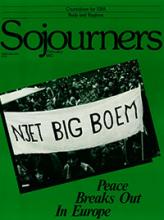While studying theology under Karl Barth in 1933, Werner Koch traveled through Europe, establishing contacts that would later help him publicize his stories of the German situation under the Nazis. Koch spent the winter of '35 and '36 with Dietrich Bonhoeffer at the Confessing Church seminary in Finkenwalde, where Bonhoeffer encouraged him to use his foreign contacts to send information about the church struggle to the foreign press.
In 1936 Koch was arrested by the secret police and held in the concentration camp of Sachsenhausen, from which he was released two years later by special order of Heinrich Himmler. He then served for six years as an interpreter for French prisoners of war and continued his resistance activities until he deserted the German army in 1945.
After the war Koch served for a time as a correspondent for radio stations in East and West Germany and then was a minister of parishes in Berlin and Westphalia. When this article appeared, Koch's work for peace continued, and with others from the Confessing Church, such as Martin Niemoeller and Helmut Gollwitzer, he was active in the European Peace Movement.
In November of 1981, while on a speaking tour of the United States, he stopped to visit Sojourners. On the following pages are excerpts from many conversations about his experiences as a member of the Confessing Church in Germany during the war and the connections he sees between his efforts then and the work for peace in the 1980s. --The Editors
A member of the Confessing Church links his times and ours.
Read the Full Article

